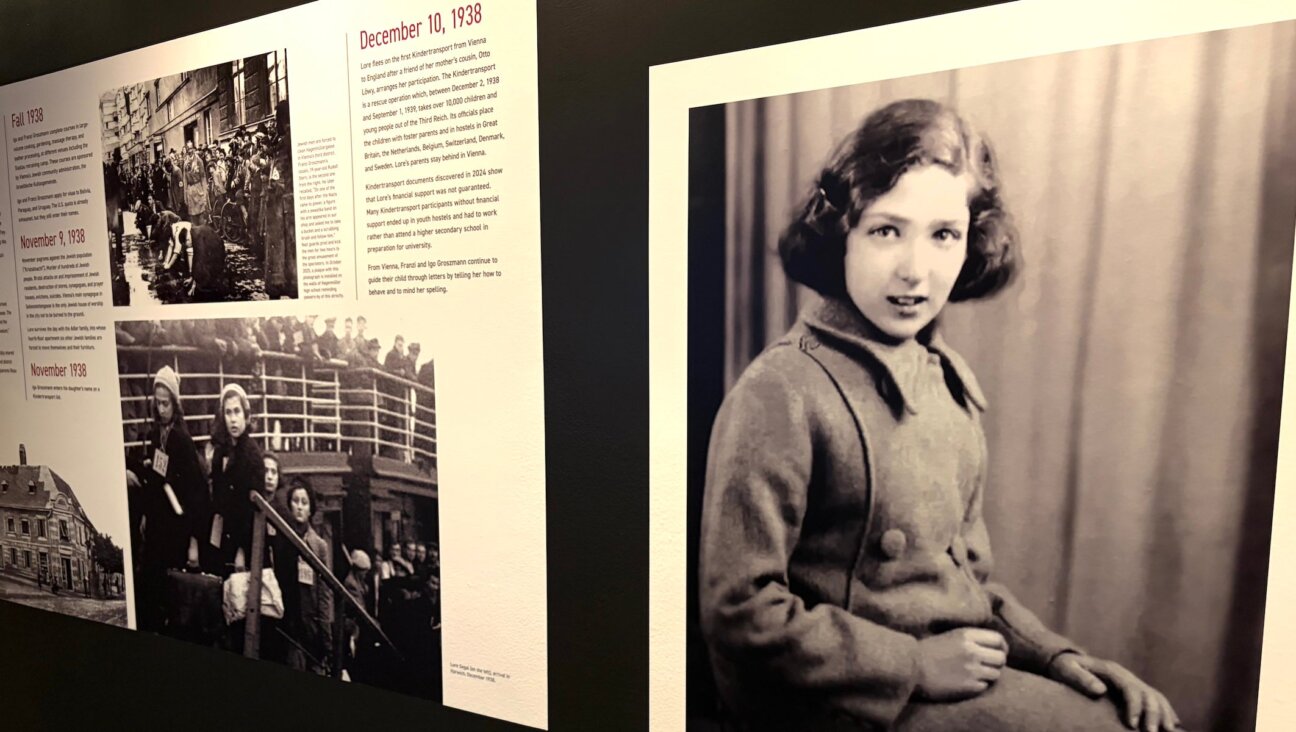How I Rid Myself of the Evil Eye

Image by Anya Ulinich
‘You came just in time!” Aidel Miller said when I walked into her home in Ramat Shlomo, a Jewish settlement in East Jerusalem. Wearing a polka dot shirt and a long black skirt, she was standing over a woman draped in a beige blanket. The woman peeked out shyly and tucked her head back in. Miller held pots of molten lead and water above the woman’s head, and poured one into the other. The concoction hissed and popped, revealing twisted shapes: metallic embodiments, Miller said, of the woman’s psychic state.
I had just walked into a Bleigiessen, or lead pouring session. Bleigiessen is a common folk practice in Germany, where the term originates. There, it is a New Year’s custom to predict the coming year by deciphering shapes in the lead. But in some Orthodox communities in Israel and beyond, it is used to cure a specific spiritual affliction: the evil eye. Miller is a well-known Israeli practitioner of lead pouring to “null all Ayin Hara,” or the evil eye, as her business card puts it.
It’s difficult to walk a single block in the Holy Land without coming across some talisman to repel the evil eye, usually in the shape of a blue glass ornament of an eyeball hung on the wall. It is a malady that occurs when a person parades his or her own good fortune; it draws the jealousy or contempt of others, which can trigger bad luck. In Jewish tradition, a person who is afflicted with the evil eye may even have his or her record reviewed in a heavenly court, to determine whether the good fortune was deserved in the first place.
The evil eye is mentioned in the Bible and also in ancient Sumerian texts. According to the late anthropologist Alan Dundes, the belief dates back 5,000 years and is found all over the Mediterranean, and also in India and Ireland. “This idea that a malign glance can do grievous harm to a person and property is of great antiquity,” he wrote in “Evil Eye,” his 1981 book of case studies across the world about the phenomenon. The concept still resonates powerfully today among Israelis and Palestinians alike. Talismans and amulets of eyeballs, sold in virtually every tourist shop in Jerusalem’s Old City, operate on the principle of sympathetic or homeopathic magic, said Lenny Wolfe, an amateur anthropologist and antiquities dealer in Jerusalem. That is, the evil eye can be thwarted by the image of another eye.
But should the evil eye strike, a curative is needed. That’s where lead pouring comes in. According to Shalom Sabar, a professor of Jewish art and folklore at The Hebrew University of Jerusalem, a similar practice first appeared in Jerusalem during the Ottoman Empire, brought by Sephardic Jews escaping Spain. The Spanish procedure, called livianos, consists of divining the future from lead shapes. It is a close cousin to Bleigiessen.
Miller, a 68-year-old hasidic mother of 11 and a fifth-generation Jerusalemite, has been practicing Bleigiessen for about 15 years. She first learned of it as a child in Jerusalem, when her brother was exhibiting extreme fears: of cats, of his father’s shoes and of the man who sold the family gas to heat the house. “My mother called a lady” for Bleigiessen, Miller said. “And after that he stopped worrying.”
Miller learned the procedure about 20 years ago, when she was living in Monsey, a hasidic enclave in upstate New York. Her neighbor taught her the craft to repay Miller for helping her raise money for her daughter’s wedding.
At first, Miller was afraid to use it on others, worrying that she would remove the evil eyes of another only to have them refocus on her. She also worried that she would contract lead poisoning, a fear that was put to rest some years ago, she said, when a doctor tested her and she came out clean. Miller’s first client was a neighbor who was desperate to find matches for her three children, all in their late 20s. She asked Miller if she knew any Bleigiessen practitioners, leading Miller to use the skills she had learned years earlier. That first lead pouring had strong results. “In three months, they got married,” she said. “I thought, hey, Hashem gave me such a blessing. Why shouldn’t I do it?”
Many similar stories followed. There was the women who couldn’t find work for more than a year. After the lead pouring she was offered a job, and her brother lent her a few thousand dollars out of the blue. Another woman of 38 couldn’t find a match. Less than a year after the procedure she came back to Miller, married, with her newborn. I asked Miller for the example of which she was most proud. “A soon-to-be bride came to me, her face was swollen. The doctors didn’t know what to do to help her,” she said. Miller poured lead. “A day later the swelling went down. It was in time, and everything was beautiful,” she said.
Today, Miller said that she has the imprimatur of several Orthodox rabbis, even as Bleigiessen is a fringe practice in Orthodoxy and beyond. She sees dozens of clients per week in Ramat Shlomo, but her main income is from the Americans who phone her with their afflictions. She has a separate, higher price for them: $101 to signify the angel Michael. (In Gematria, a Jewish numerology code, Michael’s name equates 101.) But it’s not only Jews who call on her. “The secular world and the goyim very much believe in it,” she said.
I was a Bleigiessen skeptic, but when I visited Miller in October, I asked her to do it for me for research purposes. When I walked into the house, she threw a shawl my way to “cover a little bit” because of the holy books in the room. In a side room off the kitchen was her workshop: a pile of pots filled with bits of flaking lead, camping stoves, oven mitts, a hot-water kettle and a bowl full of lead nuggets. Her husband, Avraham Miller, a rabbi, helps her acquire the metal — often from plumbers — but he said lead is growing more difficult to find, since it’s no longer in widespread use because of its poisonous qualities.
Before she began, Miller showed me a mass of lead that she used on the previous client, the one who was there when I walked in. In addition to extracting evil eyes, Miller uses the lead to divine predictions about the person’s life to come by looking at shapes in it. “I told the lady she’s going to have a house,” she said, pointing to a portion of the lead mass that looked like a small roof. She also foresaw love in the woman’s future, and eventually a child. “She needs a shidduch,” a match, Miller said.
She handed me a Hebrew prayer covered in a plastic sheet and asked me to read it three times, Then she asked: “Do you want to tell me anything about yourself? You’re looking to get married? What?” I thought for a moment. “I’m really homesick,” I said. “I miss my family. I feel guilty that I’m so far away.” She looked at me, concerned. “You have to visit them a lot. When you feel bad, go. Just go. You’re going to feel much better.” She said I should use frequent flyer miles to get cheap tickets, and “It’s also good advice to talk on Skype.”
Then she got to work. She prepared the water by dropping in three evil eye blockers: a clove of garlic, salt and a twig of ruta, a kind of Mediterranean evergreen shrub. She asked me if I needed good luck in business. Sure, I said. In went nine pieces of torn bread. I threw on the beige blanket, and she lifted the pots of lead and water above my head. I heard her mumble a Hebrew prayer, and then I heard that hissing sound as the lead hit the water.
When I took off the blanket, Miller showed me the pot filled with lead formations. I could smell the garlic. She pulled out a shiny piece of lead in the shape of a comet, with a bulb and a tail. It was an evil eye. Next she pulled out a jagged strip. It indicated that people were jealous of me. Then, one in the shape of a thorn. “It shows that things are bothering you,” she said. “Like you miss your family.” She pulled out another thorn. “Maybe there was a boy that wanted you and you didn’t want him and he’s upset. That’s what this one is.”
She did the lead pouring again, and then a third time. There were new revelations, good and bad: People had been gossiping about me; they were very jealous of me. Yet I would find love very soon. Good things — she didn’t say what they were — were coming my way.
There was one last thing I had to do to seal the evil eye removal: something to keep the Sabbath. It could be anything, Miller said. Maybe I could give up cooking for a day. I told her I would do the best that I could.
Bleigiessen nonbeliever though I was, I couldn’t help but be comforted by her words. You’ll see, she said. “Things will change for you for the good.”
Naomi Zeveloff is a staff writer for the Forward.

















